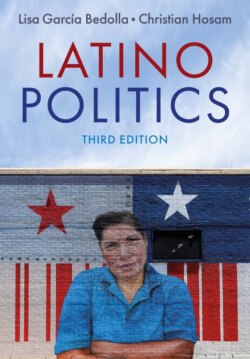Читать книгу Latino Politics - Lisa García Bedolla - Страница 14
Defining Latino: What’s in a Name?
ОглавлениеThis text examines the history, migration, and politics of different groups of Latin American origin living in the United States. To begin with, it is important to consider what these groups should be called. The title of this book uses the word “Latino,” which is meant to describe all individuals, foreign- and US-born, who have ancestry in any of the Spanish-speaking nations of Latin America.8 The term “Hispanic” was adopted by the US government during the 1970s and has the same definition as “Latino.” Sociologist Cristina Mora argues that the creation of the “Hispanic” label was the product of activists, media executives, and government bureaucrats coming together with the goal of creating a term to describe this growing population in the United States.9 Scholars and activists, particularly on the west coast, critiqued the term “Hispanic” because they thought it placed too much emphasis on the community’s Spanish ancestry. The term “Latino” was developed to underscore groups’ connections to Latin America. In general, the term “Hispanic” tends to be more commonly used on the east coast, and “Latino” on the west coast. The US government still uses the term “Hispanic,” and the media tend to use “Latino.” Scholars like Nicolas DeGenova and Ana Ramos-Zayos argue these pan-ethnic identifiers were designed by the US government to erase the particular histories of Latin American groups in the United States, such as Mexicans and Puerto Ricans.10
More recently, with the growing acceptance of gender as a non-binary category, some Latinos have begun using the term “Latinx” to describe themselves and their communities – a framing that attempts to break down the gender binary inherent in the use of Latina/o and to provide space for the inclusion of Latinos who do not identify as male or female within the identifier. Some have critiqued the term as another form of US imperialism, given that “x” does not exist in Spanish; no Spanish speaker would automatically understand what the “x” in “Latinx” means. But the term does seem to be gaining traction. In a 2020 statewide poll of Latinos in California, 24 percent of Latino registered voters reported using the term “Latinx” to describe themselves, and 56 percent said that they were familiar with the label.11
Despite the fact that these pan-ethnic terms have been in use for decades, studies have consistently shown that people tend to prefer to use their national-origin identifier, such as “Mexican American,” “Cuban American,” etc. There are also sub-identifiers within national-origin groups. The word “Chicano” is meant to describe, specifically, individuals of Mexican origin in the United States. This term came directly out of the political organizing within the Mexican American community in the US southwest during the 1960s; hence, its usage often presumes a certain political consciousness, in addition to being a national-origin identifier. “Boricua” is a term used to describe Puerto Ricans on the island and in the United States (it comes from the name of an indigenous group native to the island), and “Nuyorican,” more specifically, is sometimes used to denote individuals of Puerto Rican origin living in New York City. “Quisqueya/o” is sometimes used to describe Dominicans (it is the indigenous word for the island of Española).
Thus, there are many terms which are used to describe individuals of Latin American origin living in the United States; some of them are national-origin-specific, others spring directly from the political mobilization of the community or from the desire of group members to come up with new terms to describe themselves. For the sake of simplicity, this text uses the term “Latino” to refer to groups of Latin American origin generally, and national-origin-specific terms to describe the experiences of individuals from particular countries. By doing so, we do not mean to imply that latinidad is gendered in a binary way. We are simply adopting one of the most commonly used terms. Its use should not be interpreted as excluding or minimizing the importance of non-female or male-identified Latinos. This discussion should make clear that these labels come into and out of style and can be politically or personally important. Many Latinos choose to use different words to describe their identities – terms that are grounded in their particular historical, personal, and political experiences.
